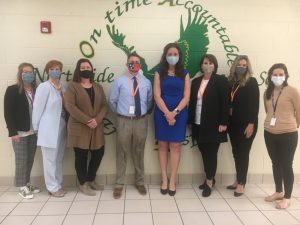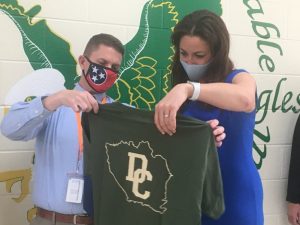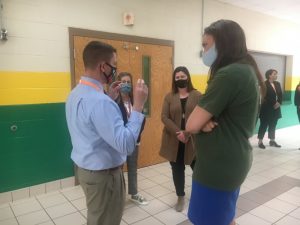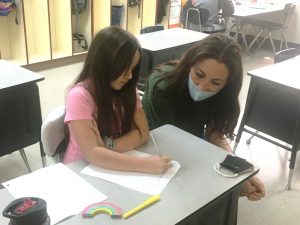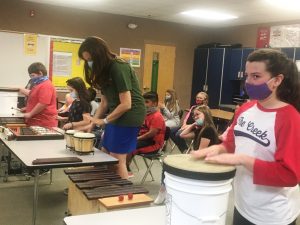April 17, 2021
By: Dwayne Page
Penny Schwinn, the Tennessee Commissioner of Education, visited Northside Elementary School on Friday.
Schwinn walked the halls and observed first hand the learning environment of students here. She even joined in with students on bongos during a music class.
Commissioner Schwinn was welcomed by Director of Schools Patrick Cripps along with Northside Elementary School Principal Karen Knowles, Assistant NES Principal Beth Pafford, and members of the central office staff including Supervisors of Instruction Dr. Kathy Bryant and Michelle Burklow and Federal Programs Supervisor Dr. Danielle Collins.
“I am thrilled to be here. Its been a wonderful visit. I want to make sure I am able to see what is actually happening in schools and talk to principals, teachers, superintendents and students to learn how we can better serve them,” said Commissioner Schwinn.
Although COVID-19 has forced school systems to change their methods of teaching over the last couple of years, Commissioner Schwinn said she is proud of the way educators have adapted.
“There are a lot of folks doing really hard work this year overcoming challenge after challenge but keeping the focus on students and that is exactly what you want to see. Our focus has to be on kids. That’s what I have seen in every classroom in this building.”
Commissioner Schwinn said she is concerned about a learning loss among students across the state due to the pandemic
“You have students who have been in quarantine who maybe have not had internet access who have been in and out of school buildings and all of them are progressing differently. We want to make sure we are providing them with what they need to be able to not just get to where we would always want them to be but to accelerate for next year,” she said.
Virtual learning has not been as effective as hoped in many cases.
“At the elementary level its really though. We’ve seen that its been a little more successful on the high school level statewide buts its really hard for little kids to learn on a computer and not have that adult support right there. That’s why we are really focusing on making sure that families and students feel comfortable being in school buildings so that when we are in person fully next year folks are able to really dive in,” said Commissioner Schwinn.
Still at the high school level, graduation rates are expected to be down statewide because of the pandemic.
“We are expecting some challenges with graduation rates especially for those students who are virtual. A lot of them have looked for jobs or become engaged in other things and its been hard to bring them back so we’re seeing a lot of investment coming into alternative programs. Can we offer more courses at night? Can we do more online courses for catch up? Remediation and support will be in place. It won’t impact the school district’s funding. We will still fund regardless of what their performance is but we really want to make sure that for those students who are not as engaged especially in the high school space there are a lot of options for them to get back on track,” said Commissioner Schwinn.
“I am seeing the light at the end of the tunnel. Its going to be a hard push to the end of the year. We are focusing on summer programs but next year we are working toward getting back to normal. That is where we need to be. That’s where our students and families want to be. Its all the hard work that goes into being able to open up next school year and be ready to go and hit the ground running,” she said.
Although it was largely a social visit, Director of Schools Patrick Cripps made Commissioner Schwinn aware of the concerns and needs of DeKalb County Schools and he was glad that she came here and took the time to listen.
“The Commissioner is always willing to listen so we told her what some of our concerns are with what is going on with education and where it is headed. We explained to her that we are facing a teacher and bus driver shortage. We also talked about the amount of testing we have to do and how it is compressed at the end of the year as well as the plans we have to write each year and how much time it takes to write those plans which keeps supervisors from being able to get out into the buildings to see more of what is going on with the kids. We also discussed with the Commissioner the virtual learning challenges we have had to face as far as the number of students not completing work or failing classes and the graduation rate where we have high school students not getting credit. I appreciate the fact that she was willing to listen to our concerns,” said Director Cripps.




